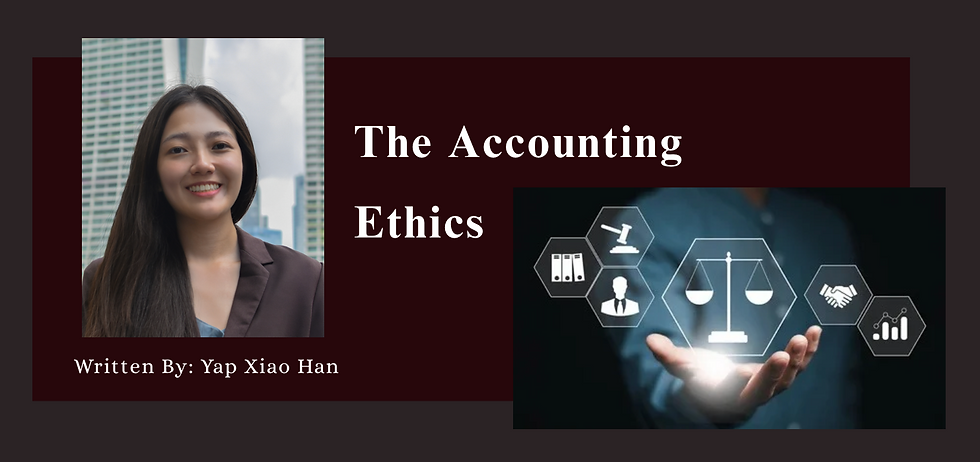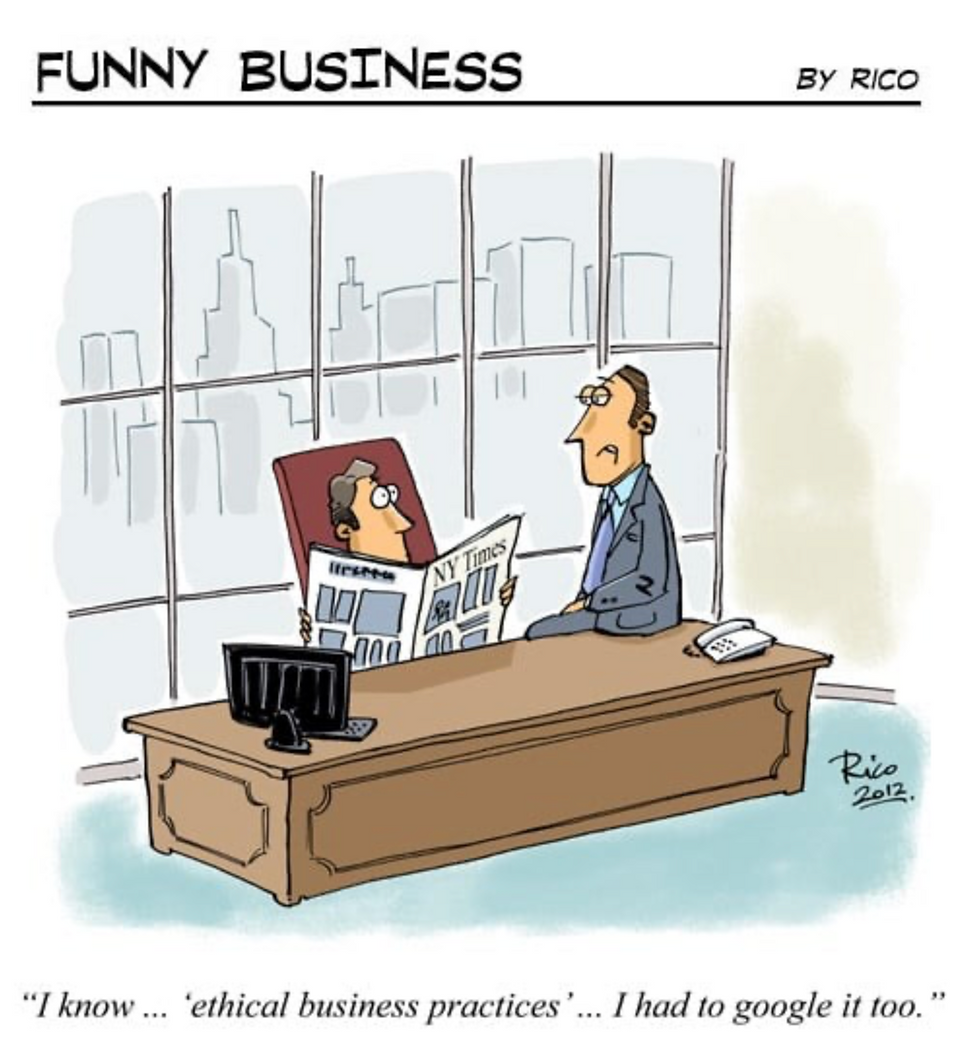The Accounting Ethics
- SIMAA
- Jul 30, 2025
- 7 min read

In this article, we will be exploring the crucial role of ethics in the accounting profession. Accountants are responsible for ensuring the accuracy and reliability of financial information, which indirectly influences business decisions and economic stability. The code of ethics that professional accountants must adhere to provides a framework for ethical decision-making. For instance, the International Code of Ethics for Professional Accountants (IEASB) stipulate 5 fundamental accounting ethics, namely, Integrity, Objectivity, Professional Competence and Due Care, Confidentiality, and Professional Behaviour (Figure 1). These ethics are vital to maintaining transparency, trust, and professionalism. Without a strong ethical framework, the integrity of financial reporting is prone to be compromised, and accountants will be caught off-guard when faced with real-world dilemmas, leading to potential financial mismanagement.

Understanding the Role of an Accountant
All certified accountants are expected to have learnt accounting ethics. So, why exactly does ethics in accounting matter? First, let us start by understanding some of the background of the accounting industry. Accountants are financial professionals employed by accounting firms or departments, who are tasked to keep, review, and analyse financial records. As accountants deal with numbers and indirectly affect the reputation of a company or firm, accountants should be ethical and trustworthy individuals to provide reliable accounting services. This is particularly critical because financial statements are often the basis for significant decisions, such as investments, loans, and business strategies. An accountant's ethical conduct ensures that these decisions are made using accurate and honest information.
Why Do Accountants Pursue CPA Certification?
To increase credibility and salary payoffs, many accountants choose to become Certified Public Accountants (CPA), who are also generally known as Chartered Accountants. With this professional title, a state board of accountancy will license an accountant, and it marks a high professional competence, thereby increasing an accountant’s salary. This is substantiated by The CMA Exam Academy, which stated that accountants holding a CMA certification reported a 24% higher median wage than those holding neither certification. Meanwhile, those with both certifications earned around 39% more. (Figure 2)

CPA vs. Non-CPA: Key Differences in Qualifications, Ethics and Paycheck
You may wonder, what are the key differences between a Certified Public Accountant (CPA) and a normal accountant and what contributes to the differences in payoffs? A normal accountant is just a professional who has earned a bachelor’s degree in accounting, usually taken at a university. On the other hand, a CPA is a licensed professional accountant who has earned his title through professional accounting governing bodies, such as Certified Practising Accountant Australia (CPA Australia), the Association of Chartered Certified Accountants (ACCA), and the Institute of Singapore Chartered Accountants (ISCA). All CPAs are obligated to adhere to specific professional standards and a code of ethics. For instance, they are expected to abide by the Association of International Certified Professional Accountants (AICAP) Professional Code of Conduct, which includes treating clients with objectivity, integrity and truthfulness while remaining free of conflicts of interest. CPAs are also updated about their knowledge of accounting standards as it is required for them to complete a certain number of education hours every year under most professional governing bodies. As such, accounting firms pay CPAs a higher amount than a normal accountant, due to the advanced credentials and licensing requirements that all CPAs possess. Moreover, given the fact that CPAs are held by a more stringent set of principles, it provides more assurance for the hiring company as it indicates lesser means of fraud due to higher commitment and accountability by licensed accountants.
The Importance of Accounting Ethics in the Profession
Now, let’s dive into the main key topic of today. How and why does accounting ethics play a big role in the accounting industry such that the knowledge about it is indispensable and essential for one to be considered professional and certified as an accountant?
Accounting ethics are the cornerstone of the accounting profession, ensuring integrity, transparency, and trustworthiness in financial reporting and decision-making processes. These ethical principles are not just abstract concepts; they form the foundation of how accountants operate, influencing their responsibilities toward clients, employers, regulators, and society at large.

At its core, accounting ethics maintains public confidence in the financial systems that underpin businesses and economies. It is crucial as it serves as the foundation of the profession, promoting integrity, transparency, confidentiality, objectivity and hence reliability in financial reporting and decision-making processes that significantly affect a company’s well-being. These principles go beyond theoretical ideas, they shape how accountants fulfil their duties to clients, employers, regulators, and society as a whole. Without the basis of ethical behaviours and a set of principles or rules to adhere to, the reliability of financial information becomes questionable. This will inevitably lead to mistrust among stakeholders, and will eventually cause a company to crumble, and accountants losing their credibility in their field of work.
Real-World Ethical Failures & Dilemmas : What Went Wrong?
Case Study: Enron Scandal
Take the case of Enron, a once-thriving energy company that collapsed in 2001 due to unethical financial practices, particularly the widespread internal fraud. The company’s accountants, along with executives, manipulated financial statements to hide billions of dollars in debt from failed projects, inflating profits, and thereby causing investors to lose billions. The scandal not only led to Enron’s bankruptcy but also the dissolution of its accounting firm, Arthur Andersen, which was one of the largest accounting firms at the time. Not only did the companies suffer, but the individuals involved in the scandal were faced with justifiable consequences as well. For instance, many executives at Enron faced criminal charges, with some receiving prison sentences. This includes former CEO Jeffrey Skilling, Kenneth Lay, who formed Enron and Enron’s former CFO, Andrew Fastow. On the other hand, Arthur Andersen LLP was found guilty of illegally obstructing justice by destroying documents relevant to the SEC investigation, which voided its license to audit public companies. Even though the conviction was overturned later on appeal, Arthur Andersen had already lost the majority of its customers and hence ceased operations. In response to the Enron Scandal, new regulations were introduced to enhance the accuracy of financial reporting for public companies. The Sarbanes–Oxley Act, imposed stricter penalties for tampering with records in federal investigations or defrauding shareholders. This act increased the accountability of auditing firms, reinforcing the requirement for them to maintain their objectivity and be unbiased in their work. Such an incident underscores how a lack of ethics can destroy not only companies but also the credibility of the accounting profession as a whole.

How Ethics Guide Accountants in Complex Situations
Case Study: Olympus Corporation Scandal
Moving on, these key accounting principles such as integrity, objectivity, confidentiality, and professional behaviour also provide frameworks for accountants to navigate complex and morally ambiguous situations, ensuring that their decisions align with the broader interests of society. Ethics training is critical in addressing real-world dilemmas. Imagine an accountant facing pressure from a client to underreport income to reduce tax liabilities. Knowing about ethical principles, such as those outlined in the AICPA Code of Conduct, would guide the accountant to reject such requests and comply with legal standards.
An example to bring this idea into context would be The Olympus Corporation Scandal.In 2011, a Japanese multinational, Olympus Corporation, was embroiled in a major accounting scandal. The company's executives had pressured employees, including accountants, to conceal massive investment losses by misreporting financial statements. This practice, known as the Tobashi scheme, involved transferring losses to offshore accounts to make the company appear more profitable. Michael Woodford, who was promoted to CEO in April 2011 quickly noticed irregularities in Olympus's financial practices, including questionable payments related to acquisitions. When Woodford raised concerns about these payments internally, he faced resistance and was eventually dismissed by the board in October 2011, only two weeks after he formally took over as CEO. Instead of backing down, Woodford took his concerns public, sharing evidence of financial misconduct with the media and authorities. His actions exposed the company's long-running scheme to hide $1.7 billion in losses through fraudulent accounting practices.
Whistleblowing and Ethical Courage in the Workplace
Despite facing significant pressure from a group of senior management team, Michael Woodford still adhered to professional ethics and transparency, resisting participation in these deceptive practices. By reporting these discrepancies to external auditors and eventually becoming a whistleblower, it led to an independent investigation that uncovered the fraudulent activities. This resulted in reforms within the company, as well as legal consequences for those involved.

This event illustrates that learning accounting ethics like integrity and professional behaviour empowers accountants to navigate morally ambiguous scenarios, safeguard public trust, and ensure alignment with societal and legal standards—even when under duress. Knowing policies such as whistleblowing policies in their respective organisations and also, for instance the Prevention of Corruption Act (PCA) in Singapore, will give accountants the courage to whistleblow on unethical behaviours as these policies serve as a shield to protect themselves and continue complying with the ethical standards. As such, learning about accounting ethics equips accountants with the necessary knowledge to handle such dilemmas responsibly, prioritizing the integrity of their work over short-term gains.
Conclusion: Ethics as the Pillar of Professionalism in Accountancy
In summary, accounting ethics are not just merely a set of guidelines, but a vital element that defines the professionalism and credibility of the accounting industry. By upholding ethical standards, accountants contribute to the stability and fairness of financial systems, through ensuring transparency, preventing fraud and building stakeholder trust. These are essential for the stability of businesses and economies. With examples like Enron and statistical evidence underscoring their significance, it is clear that adhering to accounting ethics is indispensable for any accountant aspiring to be truly professional and certified. As challenges facing the industry evolve, so too must the ethical vigilance of accountants, to ensure a secure and trustworthy financial future.
REFERENCES
Investopedia (2024) What does an accountant do? 2 October. Available at: https://www.investopedia.com/terms/a/accountant.asp
CPA Credits (2023) Accounting ethics: What every new accountant should know. 3 December. Available at: https://www.cpacredits.com/resources/accounting-ethics-what-every-new-accountant-should-know/
Got it Pass (2024) What must you know about the ACCA Code of Ethics and Conduct for the exam? Available at: https://www.gotitpass.com/post/what-you-need-to-know-in-acca-code-of-ethics-and-conduct-for-exam-acca-ab-aa-sbl-aaa-tech
Investopedia (2024) The CPA exam: What you need to know. 7 November. Available at: https://www.investopedia.com/articles/investing/111214/cpa-exam-what-you-need-know.asp
ICS Learn Singapore (2024) The importance of ethics in accounting: Best practices for maintaining standards. 13 June. Available at: https://www.icslearn.sg/blog/accountancy/the-importance-of-ethics-in-accounting-best-practices-for-maintaining-standards/
CMA Exam Academy (2024) CMA global salary vs non-CMA compensation. 13 August. Available at: https://cmaexamacademy.com/certified-management-accountant-salary-in-the-usa/
Wikipedia (2024) Enron scandal. 10 December. Available at: https://en.wikipedia.org/wiki/Enron_scandal
Wikipedia (2024) Olympus scandal. 8 December. Available at: https://en.wikipedia.org/wiki/Olympus_scandal
.png)







Comments